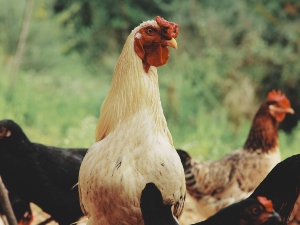
Chickens don’t have the luxury of going out and buying coats and jackets for the winter. Wild chickens have their own methods of keeping warm and fattening themselves up from the winter but not domestic chickens.
Domestic chickens fully rely on you to keep them warm during the winter. Your best bet is to fatten your chickens up for the winter, if you’re happy to do this and want to know how to fatten up chickens for winter then keep reading
You fatten up chicks for the winter by feeding them according to a meal plan that will pack on the pounds. This has to be a set and structured meal plan. It should contain a good mix of grains, ground with buttermilk or sour milk as well as proteins and fibres. If you simply add more food they will develop malnutrition and dietary issues.
Table of Contents
How to fatten up chickens for winter
When winter sets in you want your chickens to have enough plumage and body fat to be able to adapt to the change in climate. The question is how to fatten up chickens for winter?
Rather than feeding them excessive portions of various fatty foods its best to serve them a set meal plan to fatten your birds up. Just throwing more food at them can cause severe diet issues and malnutrition, this will make them sick which would cause them to be at risk when the weather changes.
A set meal plan should have reasonable amounts of food sources that contain good amounts of minerals and vitamins that naturally increase a chick’s fat and body mass.
For starters, a mix of grains, ground with sour skim milk or buttermilk along with their usual supply of water will add beneficial fat. Also include the required protein and fibres in their diets.
Cracked corn and whole grains are great add-ins to your chicken’s diet too. Include a staggering increase of mealworms and other animal proteins, these foods increase the chicken’s plumage and natural fat.
How do you tell if your chickens are too skinny?
A chicken’s feathers can make it hard to realize that you have skinny chickens. Just because they look round and fat doesn’t mean they actually are. The best way is to feel the chicken.
Reach in and feel the chicken’s underbelly, check for the keel or breastbone. If the breastbone is sharp, easy to find or if you can pinch it and it doesn’t feel fleshy, then, you have a chicken that is too skinny. This test is the same regardless of the breed of chicken.
Why is my chicken so skinny?
There are many reasons why your chicken is so skinny. It could be having a disproportional diet and because of this their body is malnourished. They could be skinny because they have worms and need to be de-wormed. They could be skinny because they are sick, for example they may have loose bowels and because of this they can’t retain their food stock. If they are ill, you want to get them to a vet to see why and maybe give them medication
How many times a day should I feed my chicken?
Chickens need a regular supply of food and water daily. There is no one set rule as to how frequently chickens must be fed. That being said, they do need a constant supply of feed.
Give them too much and they will become overweight, inactive, and ill. Give them too little and they become skinny, frail, and ill. A balance is needed to maintain healthy chickens.
Also, ensure that chickens have a constant supply of treats and water available throughout the day. Ensure they are fed at least twice daily, this is a popular recommendation from poultry farmers.
Can chickens be too fat?
The truth is, yes, chickens can be too fat. An overly fat chicken is heavy, experiences a hard time moving about. Overweight chickens are lethargic, sedentary, and prone to diseases and sickness as well as attacks from predators. An overweight chicken is often as a result of a disproportional meal plan.
Conclusion
In conclusion, the best way for you to fatten chickens up for winter is to give them a set diet that includes grains ground with buttermilk or sour milk, as well as fibres and proteins.
You can feed the chicken to check if it too skinny, and you can tell if it too fat. Both of these scenarios can be avoided if you feed then the correct amounts of food daily.
If you enjoyed this article then you may also be interested in other chicken related articles. Here are some articles that you may be interested in: Symptoms of too much protein in chickens. Can chickens eat frozen peas? Do fertilized eggs taste different? How to tell if a chicken has died in the egg

